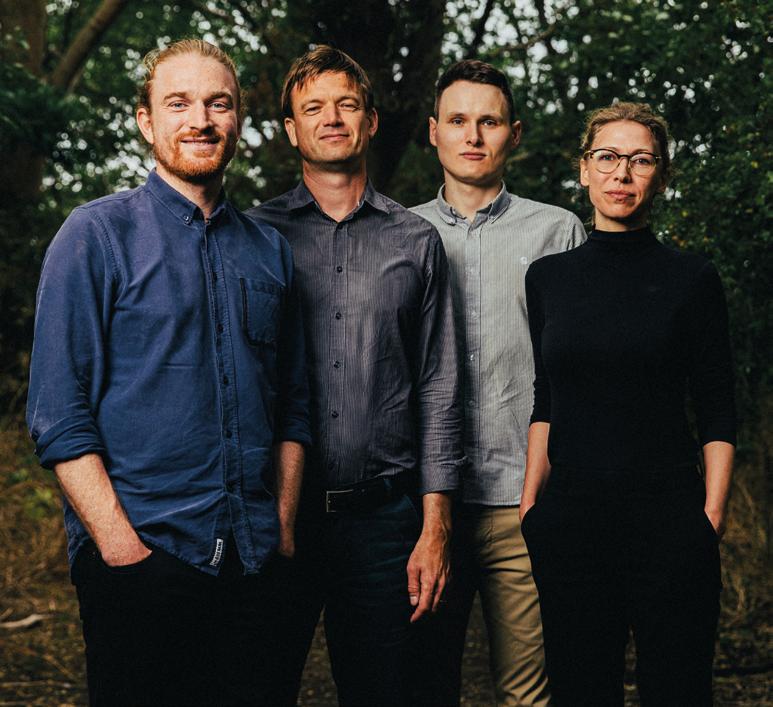
8 minute read
Fintechs Take Responsibility: Aiming to Navigate the World’s Cashflow toward Sustainability
Fintechs Take Responsibility: Aiming to Navigate the World's Cashflow towards Sustainability
We need to mobilise trillions of dollars every year if the ambitions of the UN's Sustainable Development Goals (SDGs) are to become a reality. The money is available in the financial markets, yet is not being channelled towards sustainable outcomes at the scale or speed required. However, fintech startups are aiming to change this by leveraging technology.
Advertisement
By: Sebastian Kjær Photo: Kasper Løftgaard
It is a hectic time for DoLand, the early-stage fintech startup. The company's six employees have been working almost round-the-clock at their offices at Copenhagen Fintech Lab, losing sleep in the process.
The startup is about to launch its' investment solution to the first test users. By utilising an automated investment robot – or roboadvisor – DoLand is aiming to make sustainable investments accessible for all. "We ask the users a series of questions, and afterwards our proprietary investment engine provides the user with a unique portfolio based on their selected impact themes and their financial situation.” says DoLand's Chief of Impact and Growth, Pelle Pedersen.
Despite being an early-stage startup, the company has high ambitions. They want to make the world more sustainable by helping people invest their money in accordance with the SDGs.
Most are already interested in living a more sustainable life, and DoLand aims to use technology to make it easy to include sustainable aspects in investing. Pedersen explains: "In a busy everyday life investments may not get as much attention from the Danes as consuming organics or reducing air traffic. Yet, we are very optimistic, as people are starting to live more sustainable lives. Our mission is clear: sustainable investing should be a part of a modern lifestyle."
Missing huge sums
Globally, we see a larger focus on sustainability. In 2015, the UN gathered all of the world's sustainability ambitions into 17 SDGs, which focused, not only around climate, but also poverty, equality, and peace. We are flying less and eating less meat in order to lower CO2 emissions. To protect the oceans from micro-plastic pollution, plastic straws, and bags have been almost completely abolished. And thankfully, the subject of equality is no longer confined to the feminists writing in the newspaper's debate section.
Yet while these changes are necessary, they are not sufficient. Achieving these goals requires a reallocation of capital from companies that are part of the problem to those companies that are coming up with the solution.
An additional $2.5 to $3 trillion a year is required, the 'World Investment Report' estimated in 2014. If we compare this to the $360.6 trillion in global wealth in 2019, it's clear that the capital is available, yet it is not being channelled towards sustainable development at the scale or speed required.
What is a sustainable investment?
With the vision of driving this transition, there is another Danish startup called Matter, which is working on creating radical transparency into the sustainability performance of investment portfolios.
The fintech company started two years ago by offering sustainable pension plans in collaboration with the pension fund AP Pension. En route, the team developed a tool to help them get visibility into and monitor the sustainability performance of the organisations and funds in which the pension assets were invested. While the pension offering is still available via AP Pension, Matter has shifted its focus to creating a technology solution that allows all investors – both institutional and retail – to get the same visibility into their portfolios.

"We have moved our main focus," explains Emil Stigsgaard, COO and co-founder of Matter, "today we help other financial companies to invest sustainably. We produce tools to analyse the sustainable impact of single investments as well as portfolios. Ultimately, by helping the financial sector to understand sustainability – especially how these insights can support investment or engagement strategies – we want to support a measurable shift in capital towards the SDGs."
A prerequisite to shifting capital towards sustainable solutions is to agree on when an investment is sustainable. For the past 20 years, the financial sector has relied on ESG-ratings (Environmental, Social, and Corporate Governance) to measure sustainability. The model works like credit ratings, where analysts provide a score for a given company. However, Matter does not think this is sufficient. As Stigsgaard puts it: "The disadvantage is that, to a large extent, it simplifies sustainability. Different suppliers provide different ratings for a given company, often based on opaque criteria and weightings. You can also see coal or oil companies with good ratings."
For this reason, Matter bases its sustainability insights on the expertise of those closest to the subject matter at hand: it has developed a software platform that collects data about sustainability from NGOs, academics, and international organisations that are experts in their given fields. By relying on AI and machine-learning tools, Matter can organise and combine the insights with information accumulated from reading millions of articles on a weekly basis.
“What is sustainability, and how do we measure it? Those questions are what we make transparent."
Emil Stigsgaard Fuglsang – Co-Founder & COO, Matter
"What is sustainability, and how do we measure it?" asks Stigsgaard." These are questions that we make transparent. Our system gives you access to a lot of sustainability criteria, which we provide easily and intuitively. Users receive a report, where you can see how a portfolio performs on a range of sustainability criteria, for example, whether a fund or company is free of weapons, fossil fuels, etc. You can also compare the respective fund or company to other benchmarks or organisations."
Today the tool is used to help, among others, AP Pension and Nordea to develop and maintain more sustainable funds and portfolios. By collaborating with the wider finance sector, Matter believes that they can channel much more money towards sustainability than by solely focusing on their own financial product.
From “Why” to “Why not”
Among investors, it is often said that you either choose your portfolio with your heart or with your wallet. However, the idea of it costing a couple of percentage points of return if you invest sustainably is outdated.
Over the past 40 years, 2,200 academic studies have tried to examine the relationship between sustainability and financial return. A meta-study conducted by Gunnar Friede and Timo Busch from the University of Hamburg reveals that 90% of the reports concluded that sustainable investments provide the same or a more significant return.
Pelle Pedersen, who worked with sustainable investments in a pension fund prior to DoLand, says, "This is my mantra: sustainable investments are far from driven by altruism. I have been worn out by a very conservative financial sector, which maintains some outdated approaches as to whether it makes sense to invest sustainably or not."
As an investor, it is crucial to know that one's return on investment is not reduced by integrating sustainability. And
Pedersen is predicting that companies which pay regard to climate, work environment, and equality, will only become more profitable in the future: "Forget that it is called sustainable investments. Look at the data. Even if you are a personal fan of burning coal and eating steaks, it makes sense to invest in sustainability if you care about your return – because this is what is being demanded in the future. Currently, we see an economic transformation, where legislation, consumers, and technology are changing."
Small, but crucial players
The sustainable trend is already slowly being implemented in the investment landscape. According to the organisation Global Sustainable Investment Alliance, the number of sustainable investments held by professional Portfolio Managers rose from 21.5 % to 26 % in Asia, Australia, New Zealand, Canada, Europe, and in the USA from 2012 to 2016.
Does it then make a difference that startups like DoLand and Matter are fighting to make more people invest sustainably? "There has been a lot of debate in the industry," Pedersen from DoLand acknowledges." What can an investment do, compared to not buying a steak? The conveyor belt at Tesla's production will not rapidly speed up because you and I invest all of our savings in the company."
Still, the two startups believe that it is essential that fintech companies get involved if a larger number of investments are to be redirected towards sustainable outcomes.
The sustainable transition is not occurring at the required speed, and therefore, the financial sector needs inputs from wider stakeholders. "If we let the financial sector solve this problem themselves, without any innovation from the surrounding world, what will happen is the same as we saw with the ESG-ratings," Stigsgaard says." Sustainability is complex, and we need solutions that allow financial institutions to navigate this complexity. When the financial sector solves its problems in a vacuum, it quickly becomes operational, and then some of the complexity is lost."
At the same time, he believes that collaboration across sectors is necessary, and new technologies delivered by fintech startups can provide a scalable bridge: "Experts across the wold possess critical information on key sustainability themes and what we should expect from companies and sectors. Unfortunately, this expertise is rarely brought into play, as multi-stakeholder dialogue is not built into the way the finance sector makes decisions. This is where fintech has a role to play. The technology have the potential to build a bridge between NGOs, the financial world, authorities, and citizens."
Driving more sustainable capital is all about collaboration and scale. And through analytical tools, Matter will contribute by delivering actionable sustainability insights to everyone, from pension funds to institutional investors. According to Stigsgaard: "The idea," he concludes, "is to build a scalable infrastructure. By doing so, most of the world's listed assets can be analysed by our systems. Our ambition is to move from analysing billions to analysing trillions. We believe that if we help analyse how the money is distributed today, we can catalyse more action and play a large role in closing the sustainable development investment gap."

Pelle Pedersen Chief Impact & Growth, DoLand Emil Stigsgaard Fuglsang Co-Founder & COO, Matter Jakob Lage Hansen Founder & CEO, DoLand Lise Pretorius Head of Sustainability Analysis, Matter










